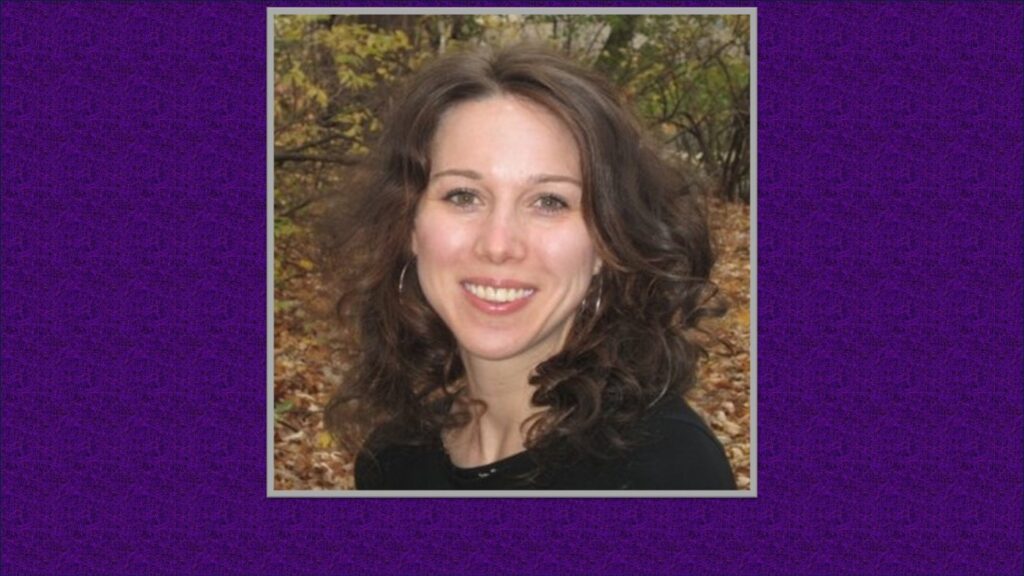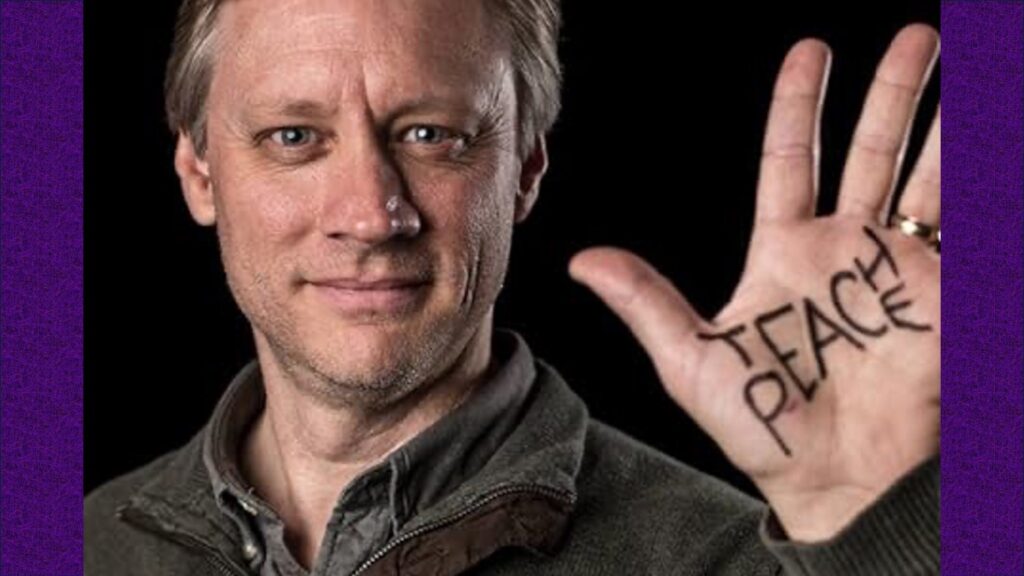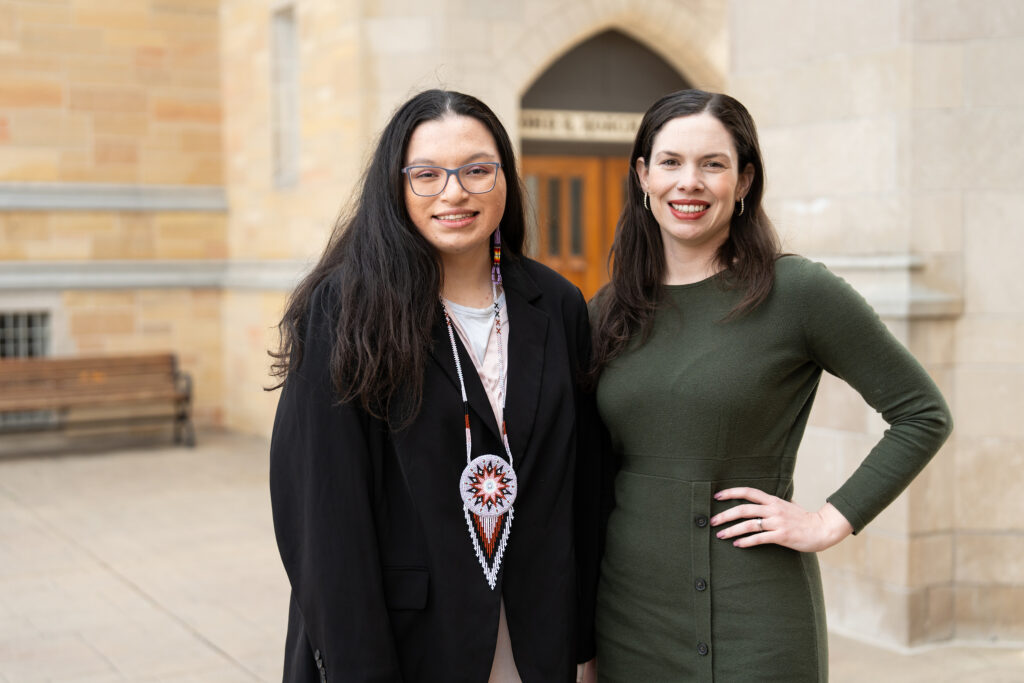Amy Levad is an assistant professor of theology, and has taught at the University of St. Thomas since 2009. Here, she writes about a theological response to mass incarceration, the subject of the fall New Frontiers lecture and the subject of her new book, Redeeming a Prison Society: A Liturgical and Sacramental Response to Mass Incarceration.
Caring about people in prison is difficult. We can easily picture incarcerated people as dangerous and dirty, as despicable, as animals in cages. “People behind bars are there for good reason—to protect us law-abiding, tax-paying, upstanding citizens from them.” “We are better off without these people.” “Good riddance.” I have spoken with many people in my family, classroom, and church who have asked me why I care about people in prison. They seem baffled that anyone would care. Some people even suggest to me that it is wrong to care for people in prison. To them, it seems that extending care to incarcerated people somehow denies the seriousness of their crimes and undermines the rule of law.
 I do not know whether I would have ever come to care about people in prison had not someone I already cared about ended up being one of them. While my relationship with my incarcerated loved one had been strained by a long series of disappointments, mostly rooted in her drug use, I could not look at her as dangerous or dirty; I could not despise her. I could not see how the prison protected anyone else from her—her crime was a nonviolent drug offense and the person she harmed most was herself. I knew that her family was not better off without her, as I saw her children struggle in poverty and wrestle with the stigmatization and isolation of having a mother in prison. And I saw no way that the prison would better enable her to reenter society and to do well as a mother, employee, or citizen. My recognition that prison offered nothing in terms of rehabilitation or reintegration into society proved true, as years after my loved one’s release, she reestablished herself and stopped using drugs—not because of any assistance or guidance from our criminal justice systems, but because of her grit and perseverance alone. Even still, she continues to struggle in poverty, existing always on the edge of survival for herself and her family. Prison did not improve my loved one, her family, her community, or her society.
I do not know whether I would have ever come to care about people in prison had not someone I already cared about ended up being one of them. While my relationship with my incarcerated loved one had been strained by a long series of disappointments, mostly rooted in her drug use, I could not look at her as dangerous or dirty; I could not despise her. I could not see how the prison protected anyone else from her—her crime was a nonviolent drug offense and the person she harmed most was herself. I knew that her family was not better off without her, as I saw her children struggle in poverty and wrestle with the stigmatization and isolation of having a mother in prison. And I saw no way that the prison would better enable her to reenter society and to do well as a mother, employee, or citizen. My recognition that prison offered nothing in terms of rehabilitation or reintegration into society proved true, as years after my loved one’s release, she reestablished herself and stopped using drugs—not because of any assistance or guidance from our criminal justice systems, but because of her grit and perseverance alone. Even still, she continues to struggle in poverty, existing always on the edge of survival for herself and her family. Prison did not improve my loved one, her family, her community, or her society.
When I came to care about one person in prison, it was difficult for me to remain indifferent to the plight of anyone in prison. I learned quickly that our criminal justice systems are in crisis and that they are tied up with social injustices—poverty, inequality, racism, and ethnocentrism. According to the Bureau of Justice Statistics, currently over 7.3 million adults in the United States are under some form of supervision, including probation, jail, prison, and parole, by state, local, or federal criminal justice systems. At midyear 2009, nearly 1.6 million people were in prison, and nearly 800,000 were in jail. We currently incarcerate people at a rate about six times what we did forty years ago. Although the United States has less than 5 percent of the world’s population, it holds nearly 25 percent of the world’s incarcerated people, according to the World Prison Population List. In short, we have more people locked up in the United States and at higher rates than at any other time in our history and than any other nation.
While these numbers are troubling enough to raise serious questions about our criminal justice systems, discrepancies related to race, ethnicity, and class add greater urgency. Black men are incarcerated at a rate six times that of the of white men, Hispanic men at a rate almost two times that of white men. The population of incarcerated women reflects similar racial and ethnic disparities as the male inmate population. In addition to racial and ethnic disparities, criminal justice systems in the United States are also marred by disparities related to socioeconomic status. Marc Mauer, of The Sentencing Project, writes in his book Race to Incarcerate, “a 1997 survey of state inmates conducted by the Justice Department found that 68 percent of prisoners had not completed high school, 53 percent earned less than $1,000 in the month prior to their incarceration, and nearly one half were either unemployed or working only part-time prior to their arrest” (178). Increasing incarceration hits racial and ethnic minority populations and the poor in the United States especially hard.
The current state of our criminal justice systems constitutes “mass incarceration,” which social theorist David Garland describes in his 2001 book, Mass Imprisonment, as having two defining features, the first of which is “a rate of imprisonment and a size of prison population that is markedly above the historical and comparative norm for societies of this type” (1-3). Data about the concentration of incarceration on young black men from socioeconomically disadvantaged backgrounds—one in three of whom will be incarcerated at some point in his life—reveal that our society also fulfills the second feature: “Imprisonment becomes mass imprisonment when it ceases to be the incarceration of individual offenders and becomes the systematic imprisonment of whole groups of the population.” For young black men in large, impoverished urban centers and their families and friends, “[i]mprisonment has become normalized. It has come to be a regular, predictable part of experience, rather than a rare and infrequent event.” The typical life events of the young—education, military service, employment, marriage—have been circumscribed by the prison.
Our criminal justice systems are in crisis, and this crisis both reflects and helps sustain a broader crisis of social justice. Many people assume that the cause of the unprecedented growth in our prison populations is an unprecedented rise in crime rates. Our prison populations, however, have consistently become larger while our crime rates have periodically fluctuated. Growing crime rates cannot explain mass incarceration. Instead several social, cultural, economic, and political factors rooted in social injustice have led to the advent of mass incarceration in the United States, independently of crime rates. We incarcerate so many people because we, as a society, have chosen to incarcerate more people for longer periods of time than we used to do.
In turn, locking up ever more people in our country exacerbates social injustice. While mass incarceration has contributed only a small amount to falling crime rates since the late 1990s, it has worsened conditions in neighborhoods that see many of their residents cycle in and out of prison. Prisoners, their families, and their communities experience greater levels of poverty, political exclusion, and social isolation, as well as potentially even higher rates of crime in impoverished neighborhoods as a result of our society’s punitive turn. Any adequate response to mass incarceration must not only provide resources for addressing crime and individual wrongdoing. It must also attend to the connections between criminal and social justice. If we are to care about people in prison, we must begin by examining both the factors rooted in social injustice that fostered mass incarceration and the consequences to social justice caused by mass incarceration.
To untangle our criminal and social justice crises, we must begin by learning to care about people in prison. Many of us are able to avoid caring about them because prisons lie outside of our immediate realms of experience. Without direct experience of prisons and prisoners, it is easier to maintain the perspective that incarcerated people are dangerous, dirty, and despicable, mere animals in cages. Insulated by racial, ethnic, and class privilege, many Americans can live most of our lives without awareness of the harsh realities surrounding mass incarceration and the ways in which many people in prison have been degraded and demeaned throughout their lives. To overcome our indifference toward people in prison and to begin to address the problem of mass incarceration, we must come to care across racial, ethnic, and class divisions and to recognize that people in prison are indeed human persons. We must also begin to envision a new kind of society that is not so willing to throw people away, especially people who have already been pushed to the edges of our communities.
As I turned this problem over in my heart and my head, and as I contemplated my Catholic heritage, which had taught me to be open to and forgiving of the other, no matter how difficult that might be, I found guidance in the heart or our tradition: the sacraments and liturgy. I have an expansive view of liturgy and sacraments not only as the words and gestures of the mass or the list of seven sacraments. The liturgy is the public service of the church in making the grace of God perceptible to human beings, thus consecrating our lives in the world. Rather than otherworldly, apolitical, or privatized religious practices, the liturgy of the sacraments draws us more deeply into the world in anticipation of the ultimate mystery of God’s reign in which life, freedom, justice, love, and peace fully take hold in our existence. Through our worship, we are called to emulate Jesus Christ, the Son of God, through the Holy Spirit, by serving God and neighbors, particularly our neighbors who have been victims of injustice. This more expansive understanding of liturgy and sacraments, while rooted in Catholicism, should be accessible to other Christian traditions as well.
Our ritual lives in church communities ought to shape Christians toward the justice disclosed in the vision of God’s reign conveyed in worship. Liturgical theologian Don Saliers, in an article for the Journal of Religious Ethics, argues that liturgy shapes the quality of our consciousness by guiding us through this vision and presenting to us a “world-picture” that stands in contrast with our worldly perspectives (1979, 180). We are asked in liturgy and sacraments to adopt a world-picture from God’s perspective, and with this perspective, we are led to appreciate the needs of others in light of God’s outpouring of grace. This vision alters us as God’s will for the world becomes our own will. Our consciousness is transformed as we continually reenter the world-picture rehearsed in liturgy and sacraments. The task of liturgical and sacramental ethics is to discern the world-picture revealed in our ritual lives and to examine how this vision shapes Christians to see the world according to the hidden reality of salvation and to work for justice in accordance with God’s reign. The sacramentality of liturgy calls us to seek this vision in all of our experiences, including our experiences outside of worship practices.
The particular sacraments of Eucharist and of Penance and Reconciliation uphold norms and values for Christians that are relevant for how we enact justice in the world, including with respect to our criminal justice systems. An examination of the biblical roots of each of these sacraments and their development in Catholic tradition uncovers what they may indicate for responses to our criminal and social justice crises. On one hand, based on the openness of Jesus Christ’s table fellowship, the Eucharist conveys a vision of covenantal relationships in which all people are included and the needs of everyone—especially the poor and oppressed—are fulfilled. This sacrament provides a foretaste of God’s reign in which death, violence, hatred, indifference, and sin are ultimately overcome. As we participate in its liturgy, we recall Jesus Christ’s death as a convicted criminal, which is emblematic of his ministry to the most despised and degraded in his midst. The Eucharist also awakens us to the ways in which we continue to fall short of the world-picture of God’s reign and offers hope that God will ultimately triumph over the principalities and powers that contribute to the marginalization, disempowerment, and endangerment of our neighbors. As we are invited into the body of Christ in the Eucharist, we must examine our individual consciences and communal relationships so that sin and injustice cannot break that body. In this sacrament, we are reoriented toward justice in God’s reign as we confront ongoing injustices in our world.
On the other hand, our practices of Penance and Reconciliation flow from the vision of ultimate justice found in the Eucharist. These practices offer alternative norms and values to retribution and punitiveness for responding to individual wrongdoing. While we need discipline and judgment within our communities, this sacrament guides us to uphold the possibility of forgiveness and to work toward the reincorporation in community of people who have harmed others and done wrong. Underlying the emphasis on eventual forgiveness in Penance is an understanding that individual wrongdoing is primarily a wounding of relationships and not only a violation of law. Where discipline and judgment are necessary, the end of any penitential actions is not to cause pain to an offender for the sake of punishment or to exact retribution, but to bring about circumstances in which a wrongdoer could be restored to full relationship. Discipline and judgment must always occur in a communal context in which all community members take responsibility for the social reintegration and internal reform of wrongdoers by offering guidance and support. Practices of Reconciliation maintain the human dignity of sinners, for the image of God within each person is inviolable and inalienable.
Although the emphasis within the sacrament of Penance and Reconciliation has typically fallen on responsibility for individual sins, this sacrament also offers guidance for addressing broken communal relationships. Penance reminds us that we are all sinners in need of forgiveness from God and our neighbors. In particular, everyone is complicit in social sin that creates the broader context of individual wrongdoing and that fosters the injustices that undergird poverty, marginalization, and oppression. Because we must seek redemption from social sin as well as personal sin, we may find in Penance and Reconciliation resources for responding not only to individual wrongdoing, but also to our participation in and responsibility for social injustice.
This description of the sacrament of Penance and Reconciliation suggests that restorative justice, a dialogue process in which victims, offenders, and community members reach consensus about how to “repair the harm” caused by a crime, is a viable alternative to incarceration, as recommended by the U.S. Conference of Catholic Bishops in their 2001 statement, “Responsibility, Rehabilitation, and Restoration.” Also, evidence-based rehabilitative programs can potentially partner well with restorative justice as a base for our criminal justice systems. While incarceration unfortunately will remain necessary in some instances, use of restorative justice and rehabilitation could enable significant downscaling of our prison populations. As Catholics consider these alternatives, they should find that rather than being retributive and punitive, restorative justice and rehabilitation connect to the vision of forgiveness, humility, community, dialogue, healing, and service offered in this sacrament.
However, because our crises of criminal and social justice are fundamentally intertwined, an adequate response to them cannot stop with criminal justice reform; we must also attend to the social injustices that mass incarceration both reflects and helps sustain. In attending to these social injustices, we must answer what kind of society we ought to become if we wish no longer to be marked by mass incarceration. Civil rights attorney Michelle Alexander argues that our vision of a new kind of society depends upon a transformation of consciousness in which we recognize the human dignity of all persons and begin to care across barriers of race, ethnicity, gender, and class. Such a transformation could spark a multiracial movement for dismantling mass incarceration.
In the Eucharist, Catholics and many other Christians experience a transformation of consciousness; a vision of what a just society ought to look like; a call to defend human dignity especially among people who have been excluded through poverty, marginalization, and oppression. As the “source and summit” of our moral lives as Christians, the Eucharist beckons us toward justice both within the life of the church and in our public service of consecrating the world. One aspect of this work for justice will be repenting of brokenness in our communal relationships and assuming personal responsibility for bringing about a new kind of society. Through Penance and Reconciliation, we may seek redemption from social sin, particularly through combined communal and private rites of this sacrament. Our penitential work will be necessary to unwind our criminal and social justice crises. The Eucharist feeds this work for justice as it nourishes hope that our vision of God’s justice will ultimately reign. In response to liturgical and sacramental ethics, then, Catholics ought to join a multiracial—and interreligious—movement as an embodiment of our public service of consecrating the world in emulation of Jesus Christ, the Son of God, through the Holy Spirit. Only through such a movement will we be able to work toward a society in which everyone as a fully human person has access to conditions that foster the dignity, unity, and equality of all.
Our liturgical and sacramental practices summon us to care for all people, regardless of the social, cultural, economic, and political boundaries that currently divide us from one another. The public service of the church embodied in liturgy draws us more deeply into the world in anticipation of God’s life, freedom, justice, love, and peace. The grace of God disclosed in the sacraments consecrates our lives in the world. Our consciousness of the injustices of this world is transformed as we enter the world-picture of God’s reign. In our celebration of the Eucharist, we are invited into a covenant in which all people are ultimately included and the needs of everyone—especially the degraded and demeaned—are fulfilled. We anticipate the triumph of God’s justice even as we remember the death of Jesus Christ as a convicted criminal. As we participate in Penance and Reconciliation, we repent of our sins. We must be mindful not only of our personal sins, but also our complicity in social sin. Within our communities, we seek ways to repair broken relationships and to be redeemed in the hope that through forgiveness, we can walk together again. The repentance and communion tied together in Reconciliation and the Eucharist draw us toward relationship, inclusion, forgiveness, and hope. Based upon this vision, our care for others must extend even into the prison cell, as well as across the boundaries upon which mass incarceration depends.
As our consciousness is transformed in these ways by participation in liturgy and sacraments, we must also envision a new kind of society. If we come to care about all persons through our experience of the eucharistic table, then we cannot be content any longer with a society that is willing to throw people away. We must endeavor to create a new society that takes seriously the inviolable and inalienable dignity of every human person. We must ensure that our society serves the good of all people. We must commit ourselves to the common good. And we must be willing to dismantle any structures, including prisons, that impede the realization of this vision.
From “theology matters,” a newsletter of the Department of Theology. Subscribe here.






